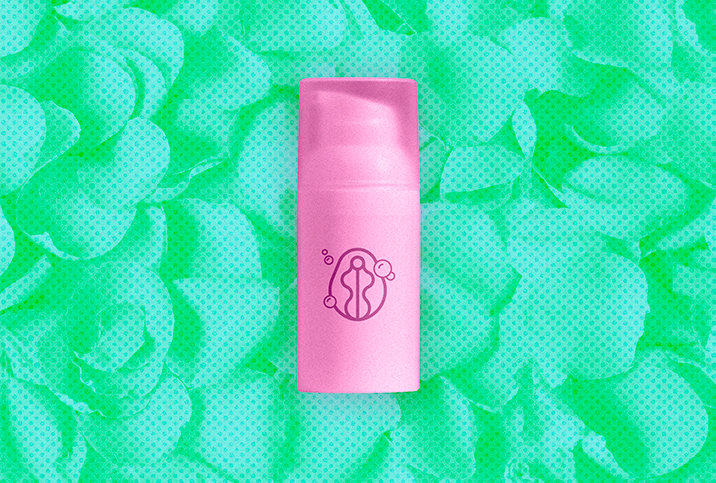No, Your Vulva Doesn't Need Skincare

The recent trend of vulva skincare is abuzz all over the internet. A cursory scroll through these products reveals promises to make your vulva feel "celebrated," "silky," "supported" and "rejuvenated."
The myriad cleansers, oils, toners, moisturizers and sheet masks for your vulva aren't cheap, ranging from $30 to $70. Such wide prevalence and high price tags require a doctor's opinion on these products.
Sensitivity is key
Sarah Yamaguchi, M.D., a board-certified gynecologist at DTLA Gynecology in Los Angeles, said gently washing the vulval area with normal soap is adequate. The vagina is self-cleaning, which means you don't need to use any special products to clean inside the vaginal canal.
Yamaguchi said if you have sensitive skin, a soap for sensitive skin should suffice with no other products needed. On the question of whether skincare products for the vulva can potentially cause harm, she suggested reading the ingredients carefully.
"A lot of products have scents or other irritants that people can be sensitive to, which can either cause an allergy or can throw off the normal balance of bacteria found in the area," she added.
A 2013 study published in Microbial Ecology in Health and Disease emphasized that vaginal hygiene products rarely come with warning labels. The study evaluated a few over-the-counter vaginal products, including one moisturizer, one lubricant/moisturizer and a vaginal douche. It concluded their use might affect the vaginal immune environment.
Any product that could alter the vaginal pH—normally about 4.5—could change the vaginal microbiome, which is essential for defending against pathogens and infection. Out of the products tested, researchers found the moisturizer to be most toxic to vaginal keratinocytes, which play a significant role in protecting the microbiome.
There are dermatological reasons to proceed with caution around vulva skincare, too.
"Vulval skin is much more sensitive than the skin on the rest of our bodies, and so gentle skincare is essential," explained Sarah Smithson, M.D., a dermatologist at Skindepth Dermatology in Australia. "Aggressive skincare can worsen preexisting vulval skin conditions or sometimes trigger a skin condition.
"Fragranced products and products with preservatives should also be avoided as they can irritate and lead to painful dermatitis. Feminine washes and wipes are also a no-go and can do more harm than good," she added.
If you require a barrier cream for chafing or dry skin, Smithson recommended using a petroleum-based ointment, and explained simple is best for the vulva.
"If in doubt, don't use it," she said.
Why is vulva skincare even a thing?
As of 2018, the value of the skincare industry had increased 60 percent from the previous decade. The increased traction of vulva skincare was part of that boom.
According to a 2019 survey by the Statista Research Department, consumers bought more skincare products they considered "natural" than in the previous year. In vulva skincare, for instance, one touted ingredient is probiotics, a wellness buzzword. A 2021 study published in Molecules evaluated the use of probiotics in cosmetics and found that although many cosmetics are labeled as containing probiotics, many fail to even comply with defining characteristics. The study called for more evidence around whether these products are truly "probiotic" and beneficial.
Another reason for the uptick in vulva skincare is the co-opting of self-care as a marketing tool. Beauty and cosmetic brands use self-care as a benefit of product use. Applying skincare can be a "mindfulness ritual" or the "five minutes of calm you experience on a Monday morning." For vulva skincare, the co-opting of self-care occurs by "giving some love and attention to an all-too-neglected area."
Vulva skincare picks up steam at a time when vaginal rejuvenation, labiaplasties and other cosmetic surgeries are also on an upswing. A 2021 report indicated that even amid the first year of COVID-19 restrictions, the number of labiaplasties performed increased. Vulva skincare marketing makes similar promises as these cosmetic surgeries: to refresh and uplift.
The secret ingredient of skincare marketing
Products that claim to change vulvas and vaginas by making them fresh, clean, silky, smooth or "smell like a dewy meadow" all share a common ingredient in their marketing tactics: shame. These products, and the marketing behind them, have the potential to contribute to inadequate feelings that people with vulvas may already have about their genitals.
"Vulva skincare" alludes to a problem you need to fix. The problem—the promotional message purports—is that vulvas are unclean, need refreshing or have pubic hair, which is not silky enough. Products to address vaginal odor have been around for more than a century. Consider an advertisement from the 1920s for Lux soap flakes that reads, "Undies absorb the odor. You don't notice it, but others do."
A 2017 study published in Sex Roles sought to understand what fuels people to use vaginal hygiene products. The study noted that advertising contributes to the overall perceived problem of vulvas simply existing and the assumption that they need to be especially clean and smell fresh. Many participants in the study listed self-consciousness and internalized shame toward their genitals as a reason for product use.
As researchers of the study argue, advertising products as beneficial for vaginal hygiene misinforms people and creates profit from potential harm.
By creating a problem to solve, marketers create an industry with room to flourish for years to come. Currently, the market for vaginal hygiene products in the United States is estimated to be around $38 billion and is expected to increase to more than $54 billion by 2028.
A male equivalent?
A quick Google search is all you need to uncover the stark realization about skincare for people with vulvas: There are few products for people without them. Some skincare products exist for people with penises, but certainly not to the multibillion-dollar scale of their counterparts. It's a severe double standard.
Though some of the vulva products claim to support your intimate skin health, you most likely don't need support unless you have a skin condition or a new symptom, in which case, head to a doctor or dermatologist for a checkup.
Yamaguchi wishes people understood one thing about vulva skincare: "They don't need to spend money on these special products."




















